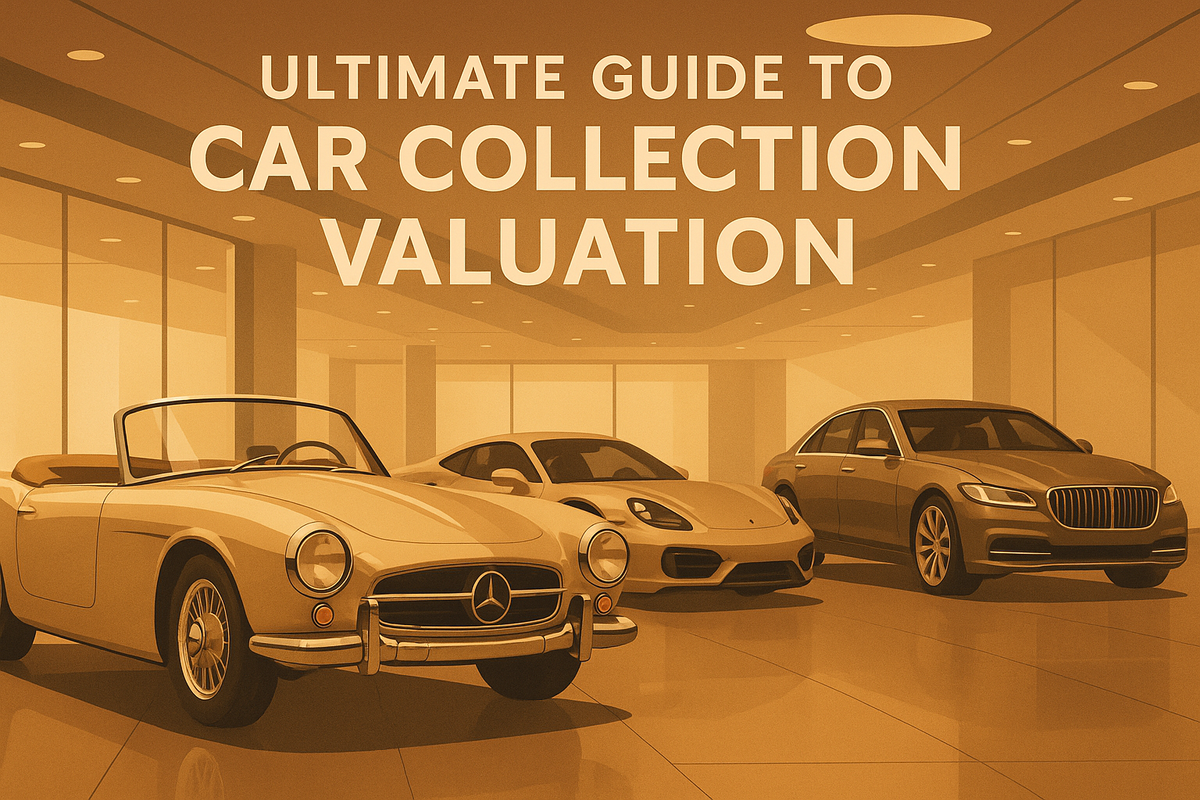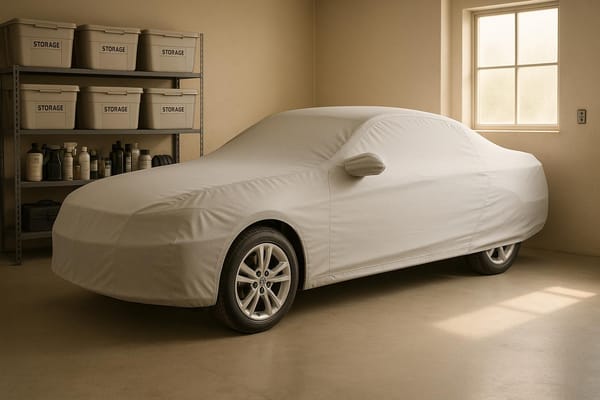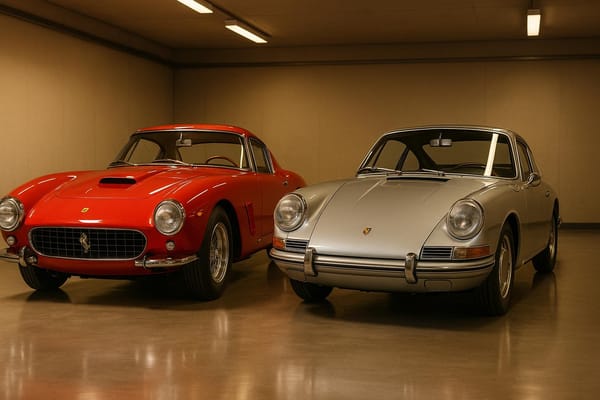Ultimate Guide to Car Collection Valuation
Learn how to accurately value your car collection, understand key valuation factors, and manage its worth for insurance and investment.

Want to know the true worth of your car collection? Here’s everything you need to know to value it accurately and manage it effectively.
Key Takeaways:
- Why it matters: Accurate valuations help with insurance, estate planning, investments, and collection management.
- What affects value: Market trends, originality, condition, documentation, and historical significance.
- How to value: Use professional appraisals, market analysis, or digital tools like MARQHAUS.
- Long-term tips: Regular updates, proper storage, detailed documentation, and insurance are essential.
By understanding these principles, you can protect and even grow the value of your collection. Ready to dive in? Let’s get started.
Here's My Brilliant and Weird Exotic Car Pricing Theory
Basic Valuation Principles
Understanding how car valuation works is key to making informed decisions.
Main Value Terms
Here are some key terms to know:
Market Value: This refers to the price a vehicle is likely to fetch in an open market under fair conditions. It can vary depending on market trends and recent sales of similar cars.
Fair Replacement Value: This is the cost of replacing a vehicle with one of the same age, condition, and specifications. It's particularly relevant for insurance purposes and includes:
- Purchase price of a similar vehicle
- Transport costs
- Import duties (if applicable)
- Registration fees
- Specialist inspection charges
Investment Potential: This evaluates a car's potential as a long-term asset, considering factors like:
- Past price trends
- Current market demand
- Production numbers
- Likely collectibility in the future
- Anticipated maintenance expenses
These terms interact with specific details unique to the UK market, which further influence a car's valuation.
Classic Car Value Factors
In the UK, several additional factors can significantly impact a classic car's value:
Provenance and Documentation
- Documents like original factory build sheets
- Complete service history
- Records of competition history (if relevant)
- Ownership history
- Period photos or related literature
Originality
The presence of original parts - such as the engine, gearbox, interior, and paint - can greatly boost a car's market value.
Condition Categories
Classic cars are often assessed based on their overall condition, which typically falls into one of these categories:
| Category | Description |
|---|---|
| Concours | Museum-quality condition, with all original features preserved. |
| Excellent | Well-maintained, showing minor wear but fully operational. |
| Good | Signs of use are visible, but major components remain intact. |
| Fair | Noticeable wear and ageing, possibly requiring some restoration work. |
| Project | Significant restoration needed; many parts may not be original. |
Historical Significance
Cars with a noteworthy history - such as race wins, celebrity ownership, or links to major events - often attract higher prices.
These factors come together to shape a car's valuation, helping guide decisions for collectors and enthusiasts.
What Affects Collection Value
Direct Value Factors
Several elements directly influence the value of a collection. Here are the key ones:
Focus and Theme
A well-defined theme or focus makes a collection more appealing and cohesive.
Condition Consistency
When all items are in consistently excellent condition, it boosts the overall value.
Completeness
Collections that include an entire series or represent a complete historical timeline are often more desirable and valued higher.
These internal aspects lay the groundwork for a collection's worth, but external factors also play a major role.
External Value Factors
External circumstances can significantly impact a collection’s value. Consider these influences:
Economic Conditions
Periods of economic downturn can lower values, while recoveries tend to reignite interest among collectors.
Regulations
Rules like ULEZ standards, historic vehicle tax exemptions, and MOT exemptions for vehicles over 40 years old can all affect long-term value.
Cultural Shifts
Trends in popularity for specific eras or models can drive up demand and pricing.
A collection that tells a compelling story or reflects a unique perspective often becomes more than just a sum of its parts.
Valuation Methods
Standard Methods
There are several ways to determine the value of your car collection:
- Professional Appraisal: Experts evaluate a vehicle’s condition, history, and market trends by reviewing documentation, conducting physical inspections, and comparing recent sales.
- Market Analysis: Analyse recent sales of similar vehicles to establish a benchmark for value.
- Condition-Based Assessment: Use grading systems to assess mechanical condition, bodywork, interior quality, documentation, and historical relevance.
- Digital Valuation Tools: Online platforms like MARQHAUS use market data and collection details to provide up-to-date valuations.
Consider the specifics of your collection to decide which method suits you best.
Method Selection Guide
The right valuation method depends on your collection’s size, worth, and purpose (e.g., insurance, investment, or estate planning). For smaller collections, digital tools can be sufficient. Larger or high-value collections benefit from combining digital tools with professional appraisals.
If you need documentation for insurance, professional appraisals are often necessary. For investment purposes, staying updated on market trends is key.
A combination of methods works best. Use digital tools for regular market tracking alongside professional appraisals for accurate and reliable valuations.
Long-term Value Management
Regular Value Updates
Keep your collection's valuations accurate by reviewing it every quarter and conducting a full assessment annually. Pay attention to these factors:
- Trends in the market for similar vehicles
- The condition of each vehicle
- Professional appraisals for high-value items
- An annual overall review of your collection
Protecting Your Collection's Value
Organising Documentation
- Maintain detailed service records
- Keep original purchase and restoration documents
- Create a photographic archive for reference
Preservation Practices
- Store vehicles in climate-controlled spaces
- Use appropriate covers for protection
- Stick to a regular maintenance schedule
Insurance and Security
- Update insurance valuations frequently
- Install security systems and tracking devices
- Implement safety measures, including fire suppression systems
Using modern digital tools can make these steps even more effective.
Digital Tools
Platforms like MARQHAUS can help you stay on top of market trends, manage your collection, and track its history. Features include:
- Real-time analysis of market trends
- Tools to track detailed vehicle histories
- Value comparison features
- Portfolio management for your collection
- Alerts for market opportunities
Blending digital tools with traditional valuation practices and expert advice ensures your collection retains its worth while uncovering new opportunities for growth.
Summary
Main Points
Accurate valuation depends on understanding the market, maintaining detailed records, and active management. The key elements include:
Core Value Factors
- The vehicle's condition and originality
- Its historical importance and ownership history
- Current market demand and rarity
- Maintaining thorough and accurate documentation
Management Practices
- Regularly monitor your collection's value
- Arrange professional appraisals for high-value items
- Follow proper storage and maintenance guidelines
These principles provide a foundation for protecting and improving the value of your collection.
Next Steps
To put these principles into action, consider the following steps:
- Set up regular valuations: Plan for quarterly and annual assessments to keep track of your collection's worth.
- Ensure proper storage and documentation: Protect your collection with the right storage conditions, updated records, and appropriate insurance.
- Use Digital Tools: Take advantage of MARQHAUS's platform to:
- Monitor market trends in real-time
- Organise and manage documentation
- Track changes in value
- Get notifications about potential market opportunities
Professional Support
- Work with qualified appraisers for valuable items
- Build connections with marque specialists for expert insights
- Join collector communities to exchange knowledge and stay informed about the market
Valuation requires consistent effort. A well-rounded approach like this can help you maintain and grow your collection's value over time.
FAQs
How can I assess whether my car collection is a good investment?
Determining the investment potential of your car collection involves evaluating a few key factors. Start by researching the market demand for the specific makes and models in your collection. Rare or historically significant vehicles often hold higher value, especially if they are well-maintained and have a documented service history.
Next, consider the condition and originality of each car. Cars in pristine condition or with original parts typically fetch higher prices. Provenance - the car’s ownership and usage history - can also significantly influence its value. For example, a vehicle once owned by a notable figure or featured in a major event may carry added prestige.
Finally, stay informed about trends in the classic and luxury car markets. Platforms like MARQHAUS can be invaluable for discovering rare and investment-grade vehicles, helping you gauge market interest and potential returns. Always consult with a professional appraiser or specialist for a more accurate valuation tailored to your collection.
How can I preserve the originality of classic cars in my collection?
Maintaining the originality of classic cars is essential to preserving their value and historical significance. Start by ensuring any restoration work is as authentic as possible, using original parts or high-quality replicas that match the car's specifications. Document any changes thoroughly for future reference.
Regular maintenance is equally important. Use appropriate fluids and materials that suit the car's age and design, and store your vehicles in a clean, climate-controlled environment to prevent rust, fading, or deterioration. Avoid modifications that could alter the car's original features, as these can diminish its value to collectors.
Lastly, consult experts or reputable platforms specialising in classic cars for advice. Platforms like MARQHAUS can help you discover authentic parts and provide insights into preserving investment-grade classics.
How do economic trends and cultural changes influence the value of car collections?
Economic trends and cultural changes can significantly affect the value of car collections. For example, during periods of economic uncertainty, collectors may prioritise more stable investments, which can reduce demand for certain vehicles and impact their market value. Conversely, a strong economy often boosts interest in high-value cars as collectors have greater disposable income.
Cultural shifts also play a role in shaping demand. For instance, growing interest in sustainability has increased the appeal of classic electric conversions, while nostalgia for certain eras can drive up prices for specific makes and models. Staying informed about these trends is key to understanding and predicting changes in valuation.




